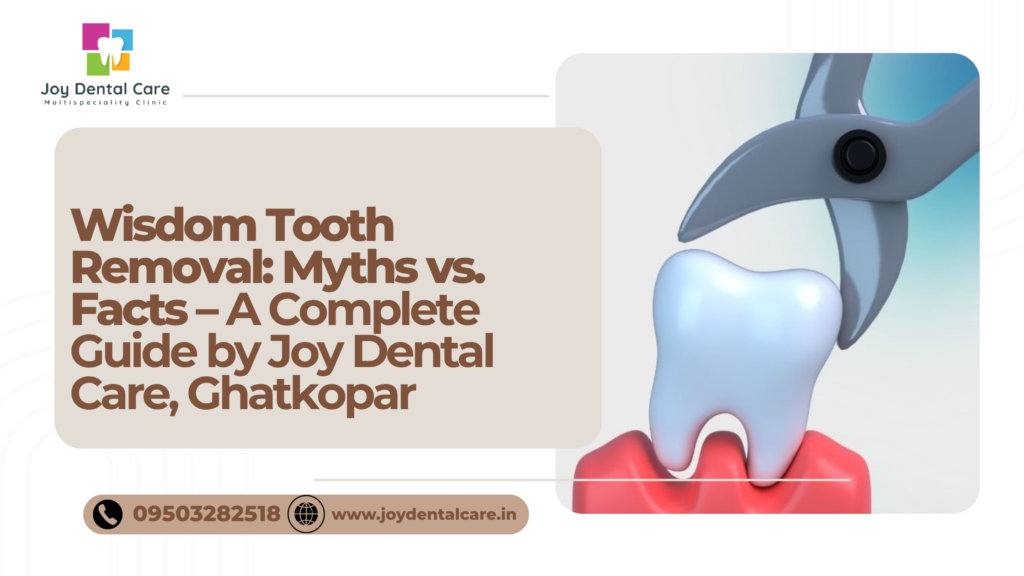Wisdom Tooth Removal: Myths vs. Facts – A Complete Guide
Wisdom Tooth Removal: Myths vs. Facts – A Complete Guide by Joy Dental Care, Ghatkopar

Wisdom Tooth Removal: Myths vs. Facts – A Complete Guide by Joy Dental Care, Ghatkopar
Wisdom tooth removal is one of the most commonly performed dental procedures, yet it remains surrounded by myths, fears, and half-truths. For many, the idea of having their wisdom teeth extracted can provoke anxiety—often fueled by misinformation. At Joy Dental Care, Ghatkopar, our goal is to replace myths with facts, so you can make informed decisions about your oral health.
This guide breaks down the most widespread misconceptions about wisdom tooth extraction and reveals the truth behind them. Whether you’re dealing with discomfort, crowding, or are simply curious, this comprehensive overview will help you understand the realities of wisdom tooth removal.
What Are Wisdom Teeth?
Wisdom teeth are the third set of molars located at the very back of your mouth. Most people develop them between the ages of 17 and 25. While some individuals experience no issues, others face complications like pain, infection, or crowding, often requiring removal.
Common Myths and the Truth Behind Them
Let’s explore the most common myths about wisdom tooth removal and clarify what’s actually true.
Myth 1: Everyone Must Get Their Wisdom Teeth Removed
Fact:
Not everyone needs to have their wisdom teeth extracted. If your wisdom teeth are healthy, fully erupted, correctly positioned, and do not affect neighboring teeth or cause pain, your dentist may recommend keeping them. Regular monitoring through dental check-ups ensures that they don’t cause future problems.
When removal is necessary:
- Impacted (trapped in the jawbone or gums)
- Causing pain or infection
- Damaging adjacent teeth
- Leading to gum disease or cavities
- Causing cysts or tumors
Myth 2: Wisdom Tooth Removal Is Extremely Painful
Fact:
With modern dental anesthesia and sedation techniques, wisdom tooth extraction is virtually painless. You may feel pressure, but not sharp pain during the procedure. Post-surgery discomfort is normal but manageable with prescribed medication and proper aftercare.
At Joy Dental Care, our experienced team ensures a gentle, comfortable procedure from start to finish.
Myth 3: Recovery Takes Weeks
Fact:
Most patients recover from wisdom tooth extraction within 3 to 7 days, depending on the complexity of the procedure. The majority return to normal activities within a few days. Following your dentist’s post-operative instructions—like eating soft foods, avoiding smoking, and keeping the surgical site clean—speeds up healing.
Myth 4: Only Impacted Wisdom Teeth Need Removal
Fact:
While impacted teeth are the most common reason for extraction, even partially erupted or fully erupted wisdom teeth may need to be removed if they cause issues such as gum inflammation, tooth decay, or crowding. Regular X-rays help detect hidden problems early, even if the teeth have emerged.
Myth 5: Wisdom Tooth Surgery Can Cause Permanent Damage
Fact:
In rare cases, temporary nerve damage can occur, but permanent complications are extremely rare when performed by a skilled dental surgeon. Choosing a trusted clinic like Joy Dental Care reduces risks and ensures expert surgical care.
Why Do Wisdom Teeth Often Need to Be Removed?
Wisdom teeth can pose several oral health risks if left untreated:
- Impaction: They may get trapped beneath the gum line, leading to swelling, infection, and pain.
- Crowding: They can push against neighboring teeth, disrupting alignment.
- Decay and Infection: Positioned far back, they’re harder to clean, increasing the risk of cavities and gum disease.
- Cyst Formation: Impacted wisdom teeth can lead to cysts, potentially damaging the jawbone or surrounding teeth.
What to Expect Before, During, and After Extraction
Before the Procedure
- Dental evaluation with X-rays
- Discussion of your medical history and medications
- Sedation and anesthesia options explained
- Pre-operative instructions provided
During the Procedure
- Performed under local anesthesia, sedation, or general anesthesia (based on case complexity)
- Surgical removal may be necessary if the tooth is impacted
- Typically completed within 45 minutes to 1 hour
After the Procedure
- Mild swelling and discomfort are normal
- Follow a soft food diet (soups, mashed potatoes, yogurt, etc.)
- Avoid smoking, alcohol, and vigorous rinsing
- Use prescribed pain relievers and cold compresses to manage discomfort
- Full recovery typically within a week
Tips for a Smooth Recovery
- Keep your head elevated while resting
- Avoid using straws (to prevent dry socket)
- Gently rinse with salt water after 24 hours
- Maintain oral hygiene without disturbing the surgical site
- Attend follow-up visits to ensure proper healing
Choosing the Right Dental Clinic for Wisdom Tooth Removal
Your experience largely depends on the expertise of your dental care provider. At Joy Dental Care in Ghatkopar, we offer:
- Advanced diagnostic tools
- Skilled oral surgeons
- A comfortable, hygienic environment
- Personalized care plans
- Transparent pricing and patient education
We prioritize your comfort and recovery with the highest standards of dental care.
Final Thoughts: Debunking the Fear
Wisdom tooth extraction is a common, safe, and effective solution to prevent or treat oral health issues. With the right information and a reliable dental team, the experience can be smooth and stress-free.
Don’t let myths stand in the way of your oral health. If you’re experiencing discomfort or want to assess your wisdom teeth, schedule a consultation at Joy Dental Care, Ghatkopar. We’re here to guide you every step of the way—with honesty, care, and expertise.
Your Wisdom. Our Care. A Healthier Smile Awaits.
